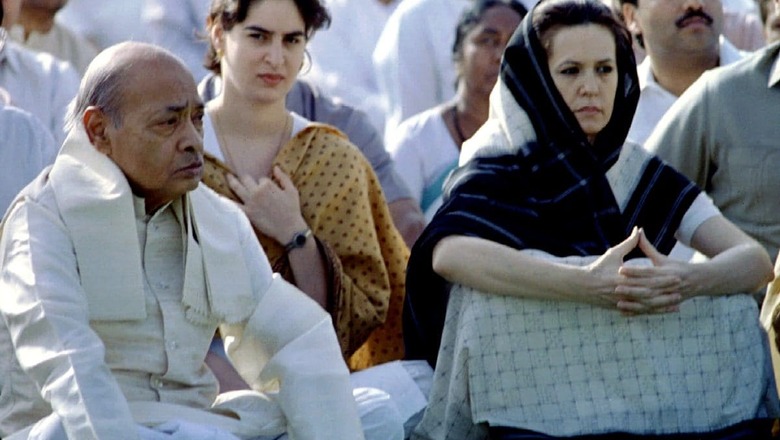
views
The master of self-goals in India has done it again. In 2014, just before the general elections, he took a “chaiwala” jibe and the fate of the Congress, which was already on a slippery ground following a series of scandals hitting the then UPA government, was sealed without doubt. In 2019, he came up with a “neech aadmi” diatribe against Prime Minister Narendra Modi, and the grand old party found itself crawling on the ground in the second general elections in a row. In 2023, he is back in the news again: This time he has trained his guns on a late Congress leader, who was “India’s first accidental Prime Minister, and a path-breaking one”, as Sanjaya Baru describes him in his book 1991.
Congress leader and former Union minister Mani Shankar Aiyar on Wednesday accused former Prime Minister PV Narasimha Rao of being “communal” and described him as “the first BJP PM” of the country. The former diplomat, speaking at the launch of his autobiography, Memoirs of a Maverick: The First Fifty Years (1941-1991), said that he discovered first-hand “how communal and how Hindu-oriented” Rao was. Aiyar narrated a conversation he had with the then Prime Minister at a time when the former was planning to lead a “Ram-Rahim” yatra.
“Narasimha Rao told me that he had no objection to my yatra, but he disagreed with my definition of secularism. I said what is wrong with my definition of secularism. He said, Mani, you don’t seem to understand that this is a Hindu country. I sat up in my chair and said that is exactly what the BJP says,” Aiyar recounted.
One can understand Aiyar’s state of mind — and, of course, the skewed sense of priorities the Congress has today — given his propensity to come out so aggressively against his own former Prime Minister, who, as Rajiv Dogra writes in India’s World: How Prime Ministers Shaped Foreign Policy, “transformed” this country. “If Jawaharlal Nehru ‘discovered’ India, and if Indira Gandhi made it ‘proud’, Narasimha Rao ‘transformed’ it,” Dogra writes fatter-of-factly.
It’s ironic to see the Congress disowning one of its own prime ministers, especially the one “whose impact on the nation’s fortune went way beyond the economy” (Baru). This comes at a time when the Congress finds itself waging an existential battle in Indian politics — and more so, when it has already forfeited a lot of its stellar leaders to the saffron party, thanks to its obsession with a family.
Sonia Gandhi was in the audience when Aiyar made this statement. He may, therefore, have the silent blessings of the “High Command”. Sonia Gandhi’s hostility for Rao is well recorded. She, in fact, singlehandedly ensured that a memorial for Rao doesn’t find a place in New Delhi, despite being in active politics in the national capital for decades. Author Vinay Sitapati, in Half Lion: How PV Narasimha Rao Transformed India, gives a graphic detail on how the late Prime Minister was denied a rightful place and space in Delhi after his death.
“The home minister, Shivraj Patil, suggested to Rao’s youngest son, Prabhakara, that ‘the body should be cremated in Hyderabad’. But the family preferred Delhi. After all, Rao had last been chief minister of Andhra Pradesh more than thirty years ago, and had since worked as Congress general secretary, Union minister, and finally prime minister — all in Delhi. On hearing this, the usually decorous Shivraj Patil snapped, ‘No one will come’,” Sitapati writes.
Thereafter, Ghulam Nabi Azad and YS Rajasekhara Reddy reached out to Rao’s family — Reddy, being the chief minister of Andhra Pradesh, promised a grand memorial for Rao in Hyderabad!
Later in the day, Prime Minister Manmohan Singh entered the room and asked Prabhakara: ‘What do you want to do with the body?’ To this, Rao’s son replied, “These people say it should be in Hyderabad… This (Delhi) is his karmabhoomi. You should convince your Cabinet colleagues.’ Manmohan nodded. Sonia Gandhi was standing near, but mostly kept quiet.
When Sanjaya Baru arrived, Ahmed Patel sought his intervention. Baru’s bureaucrat father knew Rao from the 1960s — and he was close to the family. “Sonia’s political secretary tapped him on the shoulder. ‘You know the family,’ Patel said. ‘The body should be taken to Hyderabad. Can you convince them?’”
Sitapati quotes Prabhakara as saying, “We sensed even then that Sonia-ji did not want Father’s funeral in Delhi. She did not want a memorial (in Delhi)… She did not want him (to be seen) as an all-India leader”
The next morning, when Rao’s body, draped in the national flag, was being taken to the airport, it was planned to stop at 24 Akbar Road, the Congress headquarters. “As the body approached 24 Akbar Road, located adjacent to Sonia Gandhi’s residence, the funeral procession slowed. The entrance gate to the compound looked firmly shut. There were several senior Congressmen present, but hardly any cadres had been rustled up. No slogans filled the air, just deathly silence. The carriage stopped on the pavement outside, as Sonia Gandhi and others came out to pay their respects.”
“It was customary for the bodies of past Congress presidents to be taken inside the party headquarters so that ordinary workers could pay their respects. The family was somewhat dazed when this did not happen. A friend of Rao’s asked a senior Congresswoman to let the body in. ‘The gate does not open,’ she replied. ‘This was untrue,’ the friend remembers. ‘When Madhavrao Scindia died (some years earlier) the gate was opened for him.’ Manmohan Singh now lives in a guarded bungalow a few minutes from Akbar Road. When asked why Rao’s body wasn’t allowed into the Congress headquarters, he replies that he was present, but has no knowledge of this. Another Congressman is more forthcoming. ‘We were expecting the gate to be opened… but no order came. Only one person could give that order.’ He adds, ‘She did not give it.’”
However, to singularly blame Sonia Gandhi would be unfair. She is only continuing a family-first policy that she inherited and which has been pursued for long, especially since Mrs Indira Gandhi’s time. The virus of dynasticism has badly tampered with the democratic values of the Congress, turning into a private company where the Nehru-Gandhis would alone rule and only their relatives, friends and acquaintances would assist and advise in matters of governance. How could she have forgiven Narasimha Rao, who had threatened the very existence of the family in Indian politics?
Aiyar, for all his political blunders, remains a Nehru-Gandhi loyalist. Hailing from Doon School and later St Stephen’s College, he was an integral part of Rajiv Gandhi’s PMO between 1985 and 1989, and, thanks to his closeness to the then Prime Minister, was dubbed his “Mani Friday”.
Veteran journalist Tavleen Singh, in Durbar, talks about Rajiv Gandhi’s weakness for the English-speaking, Doon School-educated Indians with whom he had grown up. “Unfortunately, like him, they were apolitical and unfamiliar with the complexities of ruling a country as diverse and difficult as India so none of them could help bring the changes that the country so desperately needed. Even in his choice of bureaucrats Rajiv was inclined towards Doon School types like Mani Shankar Aiyar, who was given charge of his relations with the media. But he was a bumptious ex-Marxist with an offensive manner that did little to endear either him, or the new prime minister, to journalists and Rajiv paid a heavy price for this later when his troubles began.”
This weakness for the “English-speaking, Doon School-educated” Indians not just created an elitist Lutyens’ club mostly cut off from the country’s realities, but also it paved the way for institutional and institutionalised corruption, especially near the power centre. Tavleen Singh writes how there was suddenly “a lot of money” among Rajiv and Sonia’s friends. “No longer did they travel economy when they went abroad and no longer did they stay with friends in London and New York. They stayed in expensive hotels and this was such a new and wondrous experience for them that they liked slipping names like Claridges and the Meurice into accounts of their travels. I remember on a trip to Washington being astounded to discover that one of Rajiv’s poorest friends spent a month occupying two suites in the Watergate hotel.”
If the Congress finds itself in a sorry state today, it’s primarily due to the dynastic nature of the party that has turned it into a family enterprise. When a family behaves like a party, and a party is made to act in favour of a family, then common political sense becomes a casualty. And common sense suggests the embattled Congress today needs Narasimha Rao and his pragmatic politics more than ever before.
Mani Shankar Aiyar is just a symptom of the malady ailing the party that has played a great role in India’s Independence. The real issue is the unabashed and entrenched dynasticism that has sucked the Congress hollow from within. This is unfortunate. Not just for the Congress but the current state of Indian politics as well. A successful, vibrant democracy needs a strong, competitive Opposition.
Views expressed in the above piece are personal and solely that of the author. They do not necessarily reflect News18’s views.




















Comments
0 comment